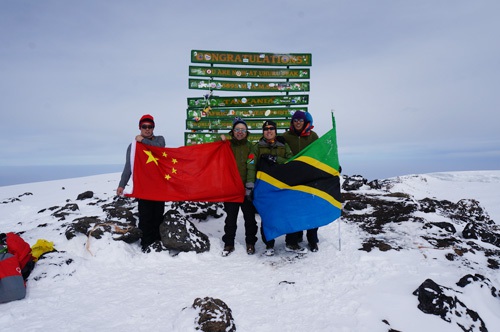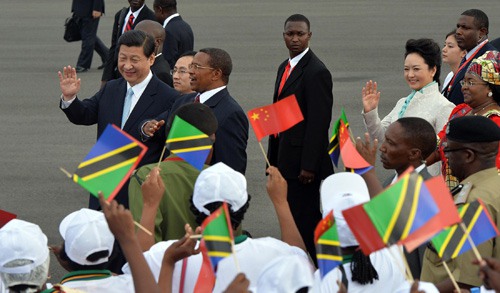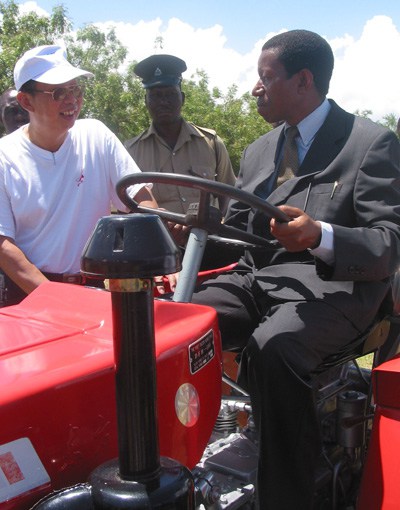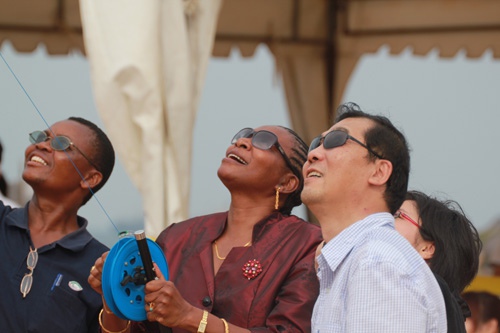|
 |
|
A China-Tanzania mountaineering team on the peak of Mount Kilimanjaro, Africa's highest mountain |
For many Chinese and Tanzanians, April 26 this year is a day of significance as it marks the 50th anniversary of the establishment of diplomatic relations between the two countries.
The most often discussed feature of this relationship is the Tazara Railway project of the 1960/70s, prompting the question of whether the relationship is only basking in its past glory.
Sun Shangxin, a senior Swahili translator at Foreign Languages Press affiliated to China International Publishing Group, often gives a lot of thought to this question. Sun worked at the Tanzania State Farm pastoral project at Mbarali in the 1970s and was later sent to the project's media office in Dar es Salaam office during the 1980/90s. Since retiring Sun has remained engaged in Tanzania-related activities, including teaching Swahili at Beijing Foreign Studies University and editing for the Swahili channel of China Radio International. Now in his seventies, Sun continues to keep up to date with online news about Tanzania.
"In the past 50 years, Tanzanians and Chinese have always been friends. Relations between the two countries are on the forefront among all China-Africa cooperation, playing a leading and exemplary role. It's a fine example for the cooperation between developing countries," Lu Shaye, Director General of the Department of African Affairs of the Chinese Ministry of Foreign Affairs, told ChinAfrica.
A fine example
In the 1970s, the China-financed Tazara Railway brought the two countries closer than ever. With rapid economic growth throughout the following years, China undertook a more extensive and intimate cooperation with many African countries. In 2013, China-Africa trade volume exceeded $200 billion, with Tanzania ranking 13th among all African countries, at $3.69 billion.
The Tazara Railway played a significant role in supporting the national liberation of Southern African countries and promoting their economic development. In 2008, the torch of the Beijing Olympics was successfully passed in Dar es Salaam. In March 2013, Xi Jinping chose Tanzania as the first stop of his first visit to Africa as China's new president, implying the importance of China-Tanzania relations; later, Zanzibar President Ali Mohamed Shein and Tanzanian Prime Minister Mizengo Pinda visited China.
High-level exchanges during the past five decades have promoted the bilateral cooperation in trade, investment, infrastructure, energy, telecommunications and agriculture. The bilateral trade volume has increased 16 times from $219 million in 2003 to $3.69 billion in 2013. Tanzania mainly exports agricultural and mineral products and imports mechanical and electrical products and textiles. Currently, 95 percent of the Tanzanian goods exported to China, which will increase to 97 percent in 2015, are tariff-free.
"Although Tanzania ranks a mere 13th, trade growth between China and Tanzania is very fast," said Cao Jiachang, Deputy Director General of the Department of Western Asian and African Affairs under the Ministry of Commerce of China.
 |
|
Chinese President Xi Jinping pays a visit to Tanzania in 2013 |
Economic exchange
Chinese people began to learn about Tanzania when the construction of the Tazara Railway started, which serves as witness to the friendship between the two countries. But in recent years, the Tazara Railway is facing pressing problems such as aging equipment and capacity shortage. According to Cao, an upgrading program is being developed to bring the railway back to its expected efficiency under the cooperation between the two governments.
China's investment in Tanzania has expanded from construction, textile and transportation to agriculture, pharmaceutical products, mineral development, and daily necessities. At the end of 2013, China, with the investment of $550 million, became Tanzania's largest trade partner and the second largest source of foreign direct investment. Currently, there are around 500 Chinese enterprises in Tanzania which create 150,000 jobs for the locals.
A new and greater cooperation, Bagamoyo Port and Industrial Zone Project, was signed during President Xi's visit to Tanzania in 2013. John H. Haule, Permanent Secretary of the Tanzanian Ministry of Foreign Affairs and International Cooperation, believes that Bagamoyo and Shenzhen have similar geographical advantages. Based on the successful experience of the Shenzhen Special Economic Zone, Bagamoyo has a great chance to become the "Shenzhen of Tanzania," promoting the overall economic development of Tanzania.
Connecting Tanzania with China, the Middle East and Europe, Bagamoyo will be completed in three years, with a handling capacity of 20 million containers per year (the current capacity of Dar es Salaam Port is 800,000 containers). It will also house facilities like a distributing center and development zone.
According to Haule, Bagamoyo will be made as industrially developed and populous as Shenzhen. At the same time, Bagamoyo will absorb a variety of industries, the processing and manufacturing industry in particular, which will attract a lot of labor force. He said, for the Tanzanian Government, Bagamoyo will be a driver for economic development; and for ordinary people, it will help them to raise income.
The projected cost of Bagamoyo Port is as high as the Tazara Railway. The construction will be financed by the Hong Kong-based China Merchants Holdings (International) Co. with an investment of $10 billion.
 |
|
Chinese products are popular in Tanzania |
Win-win cooperation
When China was helping with Tanzanian economic development, Chinese enterprises were also offered a lot of opportunities to invest overseas. Since the 1990s, China has been improving the form of foreign aid, hoping to help more Chinese enterprises enter African market through aid projects; and meanwhile, it also managed to get the local government and enterprises involved in the operation and management.
"Over the past decade, Africa has shown a trend of rapid development, which has a reciprocal demand with economic growth in China," said Cao. "Africa's development needs financial support, while China, with its abundant foreign exchange reserves, can fuel its domestic economic development and improve people's livelihood and help Chinese enterprises invest overseas as well." "Compared to the 1960s and 1970s, today China-Tanzania cooperation is more comprehensive and reaches out to more areas. Under the new structure, we have a more flexible formality and wider scope for further cooperation," Cao said.
People-to-people contacts and exchanges are also remarkable. In the past 46 years, China has consecutively dispatched 2,000 medical workers to Tanzania and provided different training courses to 3,000 Tanzanians. The number of Tanzanians who have studied in China has increased to 1,200. In different professions, they are making vital contributions to Tanzanian social and economic development.
 |
|
Chinese culture spreads in Tanzania |
New splendor
Various events and activities were launched to celebrate the 50th anniversary. The Chinese Cartoon and Animation Exhibition opened on March 19 at the National Museum of Tanzania in Dar es Salaam, attracting many local visitors. According to Liu Dong, Cultural Counselor at the Chinese Embassy in Tanzania, the exhibition targeted three main areas, including helping local art and computer technology majors learn more about animation, introducing students to China to get short-term training and strengthening the cooperation between China and Africa in animation production.
"This is the most innovative animation exhibition I've ever seen," said a Chinese visitor. "When Chinese animations come to Africa, a continent abundant in colors and patterns, the clash of cultures will sparkle with inspiration."
The activities also include climbing Mount Kilimanjaro, a photo exhibition, a martial arts competition, a hot air balloon event, and a Tinga Tinga art exhibition. A Chinese culture center will also open in July.
Among all of these events, the Swahili version Chinese TV drama, Jin's Happy Life, interested Sun Shangxin the most. It's the fourth Chinese TV drama that has been translated into Swahili and was introduced to Africa by China Radio International. "I worked in Tanzania for 10 years and learned a lot about the local culture. So I hope Tanzanian people can also have the opportunity to learn about the life of Chinese people."
Many years ago, Liu Dong came up with the idea of introducing Chinese TV dramas to Africa. Now he is planning to bring more TV adaptations of traditional Chinese literature to the African audience.
"The past 50 years show that we haven't lost what we used to have, instead we inherit it and carry it forward, making it shine with vigor in the new era," said Lu Shaye.
|